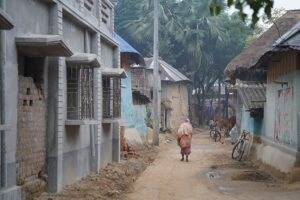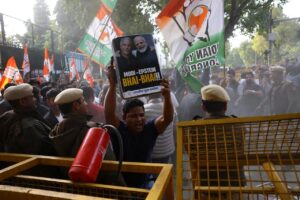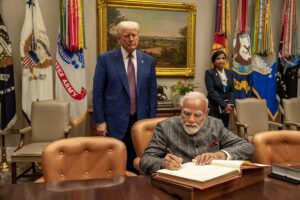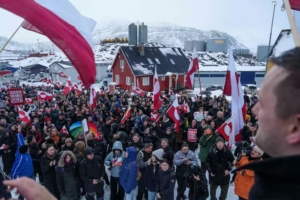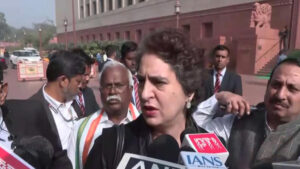COP26 Leaves Young People From Developing Countries Disappointed
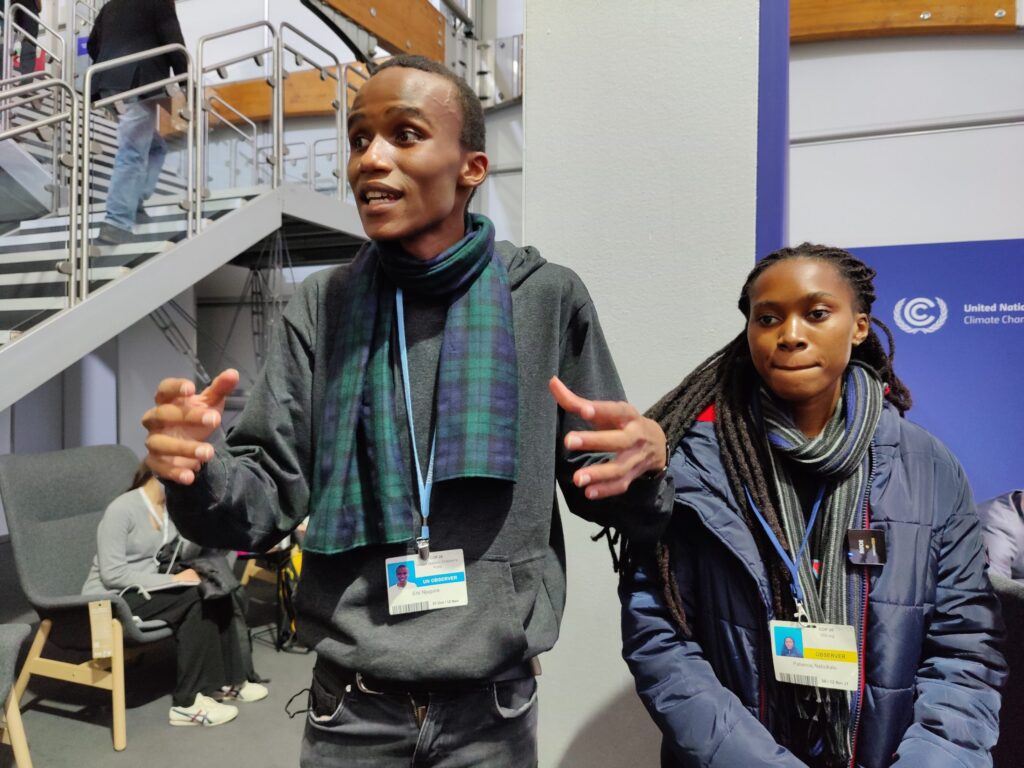
Eric Njuguna (left) from Kenya and Patience Nabukalu from Uganda said they were angry and disappointed at how COP26 panned out (Image: Disha Shetty)
It was a tale of contrasts at COP26, the 26th edition of the UN’s annual climate conference which wrapped up over the weekend in Glasgow, Scotland. While young people on the streets staged furious protests and called for urgent action, inside the key negotiations happened behind closed doors, with important actors like the US, China and India doing more to lower ambitions than raise them.
As the conference came to an end, the anger and disappointment among young people – especially those from developing countries who faced difficult odds getting to COP26 in the first place – was palpable. A lack of concrete action and the failure of rich countries to deliver on climate finance were key reasons for their despair.
Clear Science, Clearer Failure
“For me, having come to COP26 at a time when the science is clear, the cognitive dissonance is astounding,” said Eric Njuguna, a climate activist from Kenya. He spoke of the drought in his home country, Kenya, affecting millions, which the government was forced to declare a national disaster. “It is just aggravating to see that no commitments are being made.”
The world needs to reach net zero by 2050 to keep global temperature rise within 1.5 degrees Celsius. With the average global temperature already around 1.2C above pre-industrial levels, many countries are battling a rise in extreme weather events.
“It is really so sad that we are going to go back to [our] countries very angry,” said Patience Nabukalu, a climate activist from Uganda. Nabukalu said that she was in Glasgow to demand the billions of dollars rich countries promised to give to developing countries to deal with the climate crisis.
In 2009, when COP15 was held in Copenhagen, developed countries promised to extend USD 100 billion a year in climate finance to developing countries by 2020. This has not yet happened, with some developed countries now extending that date to 2023. Maybe more important is the issue of loss and damage due to the rise in extreme weather events. Poor countries, with limited infrastructure, have contributed the least to global carbon emissions, and yet have to bear the additional cost of increased disasters. While the Glasgow Climate Pact finally recognised loss and damage in principle, no plans have as yet been made to deal with the finances required.
Covid-19 Restrictions And Travel Costs Restrict Voices
The Covid-19 pandemic only added to feelings of inequity. While less than 5% of people in low-income countries have received even one dose of a vaccine, rich countries are already giving their populations booster shots and vaccinating their young people.
For citizens from developing countries, this has meant reduced access as travel restrictions are in place. Additionally, there is the high cost of a COP taking place in a developed country.
“We have a delegation of 15 young people from Brazil and it was really hard to get here because the Brazilian real is so [weak] compared with [the British] pound,” said Isvilaine da Silva Conceicao, a climate activist from Brazil. Nevertheless, she stressed it was important for them to be there. “We need to [physically] be in the spaces to pressure our government.”
Conceicao added that she has lots of friends from African countries who could not travel because of Covid-19 restrictions. “It was really bad because they have a lot to say and they need to be heard. [Hosting] the COP in countries that are difficult to come to and so expensive for us from the [global] south… it’s really hard to have a lot of the voices heard.”
Those Suffering Need A Say, Say Young People At COP26
Aside from the difficulties of getting to COP26, the young activists from developing countries who spoke with The Third Pole said that hopes raised in the early days of the summit dissipated as declarations did not transform into action. As the impacts of climate change intensify, and several small island nations face the risk of being submerged by rising sea levels, young people from developing countries said the urgency their situation demands was not being responded to by world leaders.
There were many young activists attending COP26 as observers. But they wanted to do more than observe, and were keen to be allowed to participate in the actual negotiations.
“We are the victims, not them [the negotiators]. It’s us [who have] to be given microphones, not them. They should go out of the conference rooms and let the most affected people start raising their voices and demand for climate justice,” Nabukalu added.
Across the board, activists who spoke with The Third Pole felt that negotiators from developing countries were the saving grace of the summit, who were doing their best to push climate justice. They expressed disappointment that the discussions did not look at radical ways of thinking. The failure of rich countries to step up and take responsibility for their actions was another common issue the young attendees were angry about.
‘Not Here To Defend Governments, But People’
For Jaciara Beatriz Sousa de Vasconcelos, who is from an indigenous community in Brazil, it was the lack of indigenous voices that was concerning. She also made a distinction between the government’s stance and that of delegates like her. “We are not here to defend Brazil but we are here to defend the indigenous people. And we know that forests are better when they are protected.”
“We need to protect indigenous people because they are the future, they are the past, and they always stand up for the forests,” Vasconcelos added.
Many of the young activists questioned why renewables were being pushed as a “magic wand”, given that some of the proposed solutions – like large-scale solar or hydro projects – may displace indigenous people from their land. Greenwashing and lack of conversations on racial justice were other issues the youth felt this COP had failed to address.
There was visible solidarity and cooperation between climate activists in developing and developed countries. Luisa Neubauer from Germany criticised her government for not being bold enough. She said her country “doesn’t speak to me as if the climate crisis was my problem, and betrays Eric [Njuguna] and everyone else. You’re [Eric is] facing the consequences of the inaction of my government today.”
What many did express was that while they did not get a seat at the negotiating table, they were able to occupy space at COP26: by being visible, their issues were heard to some extent. This was a small win at a conference they had struggled to attend, and whose outcomes were far less than they had hoped.

